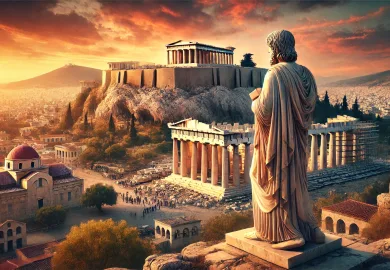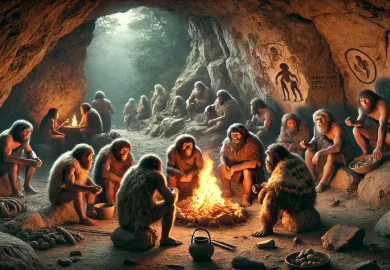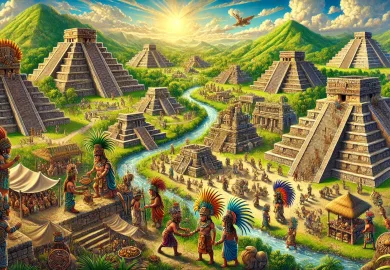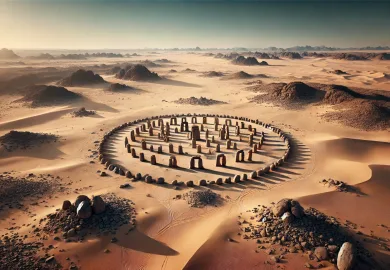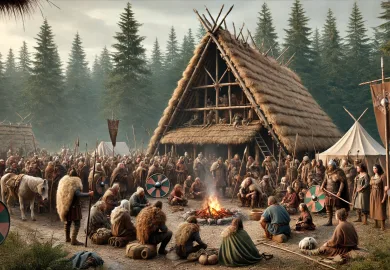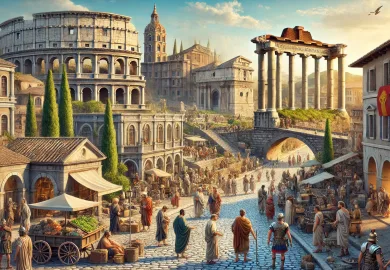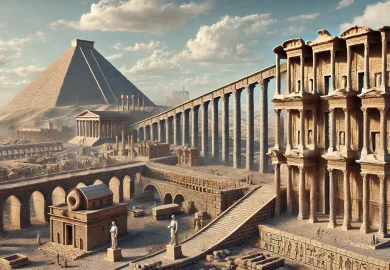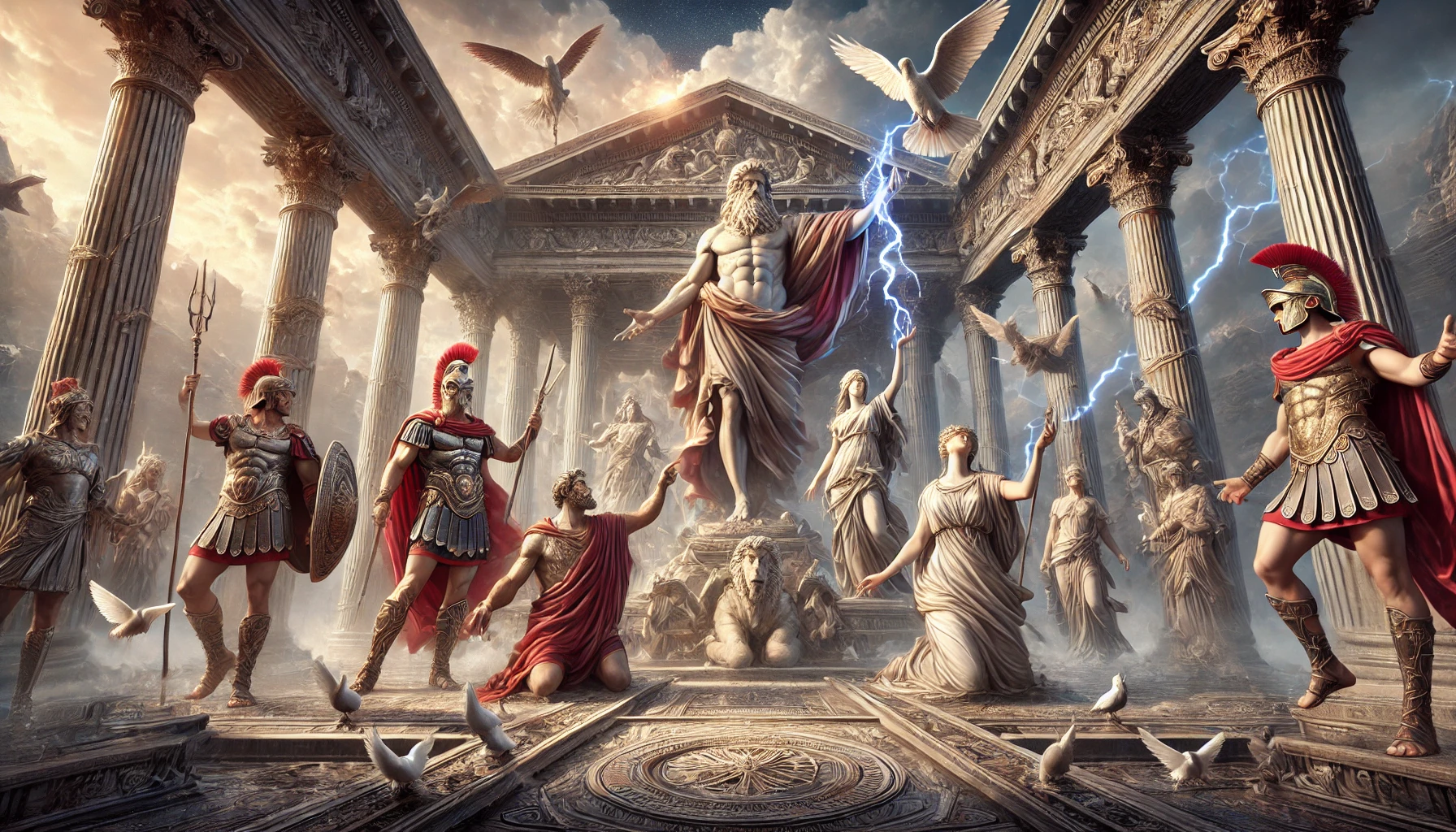
Disclaimer: This content was generated using AI. While I strive for accuracy, I encourage readers to verify important information. I use AI-generated content to increase efficiencies and to provide certain insights, but it may not reflect human expertise or opinions.
Ancient Roman mythology is a vast and intricate tapestry woven with stories of gods, goddesses, heroes, and epic adventures. Deeply rooted in the beliefs and traditions of Rome’s early civilizations, these myths have transcended time, influencing not just Roman culture but also leaving an indelible mark on modern literature, art, and society. From the towering gods of Mount Olympus to the legendary tales of mortal warriors, the myths of ancient Rome offer insights into the psyche of the Roman people and the way they viewed the world. In this article, we will explore the main deities, myths, and the influence of Roman mythology on modern culture, ensuring you have a deep understanding of this ancient tradition.
The Origins of Roman Mythology
Ancient Roman mythology was heavily influenced by Greek mythology, but it retained its distinct characteristics that reflected the values and beliefs of the Roman Empire. While the Greeks focused more on the exploration of human nature through their gods, the Romans viewed their deities as protectors of the state and divine rulers over various aspects of life.
In the early Roman Republic, myths played a central role in both religion and politics. Mythology in ancient Rome was often used as a tool to explain natural phenomena, political situations, and historical events. Many stories emphasized virtues such as duty, bravery, and discipline, which were crucial in the shaping of Roman identity. Roman gods were seen as powerful beings who demanded respect and loyalty, aligning with Rome’s militaristic and authoritarian nature.
Despite the influence of Greek myths, Roman mythology was uniquely its own. Roman deities, such as Jupiter, Mars, and Venus, had distinct roles that differed slightly from their Greek counterparts, showing how mythology evolved with Roman culture and political power.
The Pantheon of Roman Gods
The Roman pantheon was filled with gods and goddesses that ruled over every aspect of life, from love and war to agriculture and the underworld. While many were adapted from Greek mythology, Roman gods took on unique characteristics and played crucial roles in Roman religion.
Jupiter, the king of the gods, ruled the heavens and was considered the protector of the Roman state. His wife, Juno, was the goddess of marriage and the protector of Roman women. Together, they were central figures in Roman worship, and many temples were dedicated to their honor.
Mars, the god of war, held a special place in Roman society due to the Empire’s focus on military conquest. Unlike the Greek god Ares, who was seen as a chaotic and violent figure, Mars was respected as a disciplined warrior and a father of the Roman people. His influence was so great that one of the months of the Roman calendar, March, was named after him.
Other notable gods include Venus, the goddess of love and beauty, and Mercury, the messenger of the gods. These deities were not just figures of worship but also symbols of Roman values such as beauty, communication, and martial prowess.
Roman Myths and Their Heroes
Roman myths are rich with tales of heroism, sacrifice, and the interaction between gods and mortals. One of the most famous Roman myths is the story of Romulus and Remus, the twin brothers who were said to have founded the city of Rome. Raised by a she-wolf, the brothers grew up to be fierce warriors. According to legend, Romulus eventually killed Remus in a fit of rage and became the first king of Rome, marking the birth of the Roman Empire.
Another significant myth is the tale of Aeneas, a Trojan hero who played a crucial role in Roman mythology. After the fall of Troy, Aeneas led a group of survivors to Italy, where they became the ancestors of the Roman people. His journey, chronicled in Virgil’s epic poem “The Aeneid,” is one of the most famous stories in Roman literature and highlights the values of duty and piety that were central to Roman identity.
Roman mythology also includes the story of Hercules, a hero known for his strength and endurance. While Hercules is often associated with Greek mythology, his deeds and adventures were equally celebrated by the Romans, who saw him as a protector and a symbol of overcoming adversity through sheer determination.
The Influence of Roman Mythology on Modern Culture
Though ancient Roman mythology belongs to a distant past, its influence on modern culture is undeniable. The gods, heroes, and myths of Rome continue to inspire art, literature, and popular culture in various forms. Roman deities are frequently referenced in books, movies, and television shows, reminding us of the enduring legacy of these ancient stories.
In literature, Roman mythology has influenced countless authors over the centuries. Works like Dante’s “The Divine Comedy” and Shakespeare’s plays often incorporate Roman gods and myths, demonstrating how Roman mythology has woven itself into the fabric of Western storytelling.
In modern times, Roman mythology is also a source of inspiration for fantasy novels, video games, and even comic books. Characters such as Wonder Woman, whose origins are tied to the gods of Roman and Greek mythology, show how these ancient stories continue to captivate the imagination of contemporary audiences.
Moreover, Roman architecture and art were heavily influenced by their mythology, and modern buildings often draw inspiration from these classical designs. The use of Roman columns, arches, and statues in government buildings across the world is a testament to the lasting impact of Roman culture and its mythology.
Rituals, Festivals, and Worship in Roman Mythology
Religious practices were a cornerstone of Roman life, and the mythology of ancient Rome was deeply integrated into the daily rituals and festivals celebrated throughout the Empire. The Romans believed that maintaining a strong connection with the gods was essential for the prosperity of their society. This belief manifested itself in elaborate ceremonies and public festivals, many of which were tied to significant myths.
One of the most important religious festivals in ancient Rome was the Saturnalia, held in honor of Saturn, the god of agriculture and wealth. During this festival, social norms were temporarily overturned: slaves were treated as equals, and people exchanged gifts, a tradition that has influenced modern celebrations such as Christmas.
The Lupercalia was another ancient Roman festival, celebrated in honor of Lupercus, the god of fertility. This event, held in mid-February, was meant to purify the city and promote health and fertility. Over time, the festival’s themes of love and fertility became intertwined with modern Valentine’s Day traditions.
Temples dedicated to the gods were spread throughout Rome, with the Pantheon being one of the most famous examples. Inside these temples, offerings and sacrifices were made to appease the gods, ensuring that they would continue to protect the Roman people and their empire. The rituals of ancient Roman mythology served not only as a religious duty but also as a way to reaffirm the unity and strength of the Roman state.
Conclusion: The Enduring Legacy of Roman Mythology
The stories, gods, and heroes of ancient Roman mythology have transcended time and continue to influence our world in profound ways. Whether through the epic tales of Aeneas, the legendary feats of Hercules, or the powerful symbolism of Jupiter and Mars, Roman mythology remains a significant part of Western culture and thought. Its impact is visible in literature, art, architecture, and even modern festivals and traditions.
Understanding Roman mythology allows us to gain insights into the beliefs and values that shaped one of the greatest empires in history. By exploring the myths and gods of ancient Rome, we connect with a rich cultural heritage that continues to inspire and intrigue us today.

